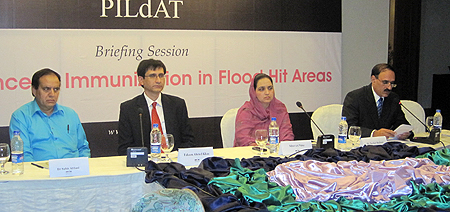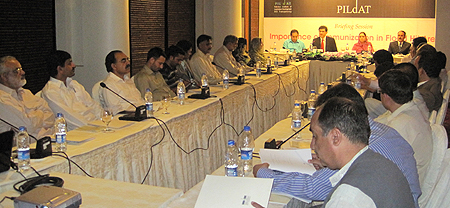|
|
| |
| EVENTS |
|
|
> Government urged to join hands with Legislators, civil society and media to promote immunization in flood affected areas
|
| |
|
Immunization Awareness Programme
September 28, 2010
Muzaffarabad
|
|
| |
Muzaffarabad, September 28: Members of the Legislative Assembly of AJK, government officials, media persons and civil society representatives strongly urged the government to collaborate with all stakeholders while launching immunization campaigns in flood affected areas. PILDAT had organized a briefing session on the Importance of Immunization in Flood Hit Areas of AJK where participants shared their views and concerns about the current situation of health and immunization campaigns in flood affected areas. |
|
| |
The pledge was made by the participants at the PILDAT Briefing Session, chaired by Ms. Mehrun Nisa, Deputy Speaker AJK Legislative Assembly, to work in their respective spheres of influence to create awareness regarding importance of immunization in flood hit areas.
|
|
| |
In his introductory remarks, PILDAT Projects Manager Mr. Faheem Ahmed Khan said that the AJK Assembly had created a caucus on the promotion of Immunization in the Azad Jammu and Kashmir to chart out future course of action after holding in-depth discussions on importance of immunization. However, the worst-ever floods in the ensuing months have necessitated that the caucus focus on a strategy to raise awareness about immunization in flood-hit areas. |
|
| |
Dr. Sardar Shabbir Abbasi, Provincial Programme Manager, Expanded Programme of Immunization-EPI, presented an overview of immediate response in the wake of floods in Pakistan. He said the children under the age of 5 years were in the category of the most vulnerable community and their number stood at around 15 million in 77 districts affected by the floods. However, he admitted, the number of children reached through the emergency response programme was very small and did not mitigate the threat of large outbreak of epidemics. Of the 77 affected districts, six were in AJK and had seen complete vaccination of measles, he said. He informed that the EPI was launched in AJK in 1978 as a pilot project to target 8 different diseases. In 1992 it was brought on normal budget but as yet 22 union councils were without an EPI centre in violation of the PC-1. However, these 22 union councils were being catered by their adjoining union councils with an EPI centre. Giving credit to political commitment in the AJK, he said that AJK was a polio free area for the past 10 years whereas in Pakistan 19 polio cases had come to fore by July 2010. |
|
| |
District Health Officer Muzaffarabad Dr. Sabir Abbasi was of the view that if preventive treatment had been given preference over curative treatment people could have avoided a number of health and economic problems. Giving examples, he said consumer protection was almost negligible in Pakistan and strict punitive actions against the sale of adulterated or expired items were also missing. There should be rules and regulations about street vendors selling food items. Apart from ensuring hygiene, vendors should also be subject to medical examination, he said. He went on to say that even the driving licenses should not be issued without complete psychological and physical fitness tests of the applicants. Psychological tests, awareness of traffic laws and realization of the pricelessness of human lives should precede the expertise in driving, he said. Responding to a question Dr. Shabbir Abbasi lamented that the files about their demands were gathering dust in the finance department. �Unless we are provided with sufficient human resource by the government it is difficult to cope with the situation,� he said. Responding to the second portion of question about supervision and monitoring of the field staff, the EPI Programme Manger said those who provided funds were not only monitoring performance but also conducting its evaluations. According to him, the AJK had excelled the four provinces and Gilgit-Baltistan in achieving its targets regarding immunization. Of his predicaments, he said that the EPI was compelled to hire staff for immunization of polio vaccines at the rate of Rs. 250 per day (8 hours). �Even the daily wage of a labourer is more than Rs. 250 which is why we hardly find people willing to do the job against this amount,� he said, adding, the EPI was therefore compelled to engage lady health workers for the task. Dr. Shabbir Abbasi agreed with the suggestion of MLA Ms. Noreen Arif that schools should be involved in the immunization campaign to achieve maximum results particularly in areas left out by vaccination teams. |
|
| |
Journalist Raja Iftikhar questioned the claim of Dr Shabbir Abbasi that there had not been any polio case in AJK for the past 10 years while recalling some media reports about reported occurrence of three cases. The EPI Programme Manager dismissed the reports, maintaining that there was a proper procedure to check existence of polio and that a polio case could not be hidden or concealed. �We may hide a case here but we cannot hide it in the laboratory,� he said. Dismissing a common perception about the validity of polio vaccine vile, he disclosed that it suffered no harm even if it remained exposed to 30 degree Celsius for 30 consecutive hours. Nevertheless, a demand for provision of 48 solar refrigerators for storage of vaccines had been sent to the UNICEF and the focus for their supply was far flung areas, he said. |
|
| |
Asked by journalist Tariq Naqash about the situation in Neelum district, Dr. Shabbir Abbasi said a rapid assessment survey in the area suggested that shelter, food and medicines were immediate needs. �We have dispatched medicines through helicopters besides conducting vaccination of measles and vitamin A in the valley,�. He said flood victims had mostly been hit by water borne diseases but no major epidemic had been reported from Neelum valley. |
|
| |
However, Minister for social welfare Ms Shamim Ali Malick pointed out that vaccination teams had not accessed some remote areas of valley, such as Nagdar, Dawarain, Surgan and Lawat Bala as she had personally learnt it during her recent visit. Dr Shabbir Abbasi assured the minister that he would personally look into this complaint. |
|
| |
Drawing attention towards the issue of adulterated and unhygienic food being sold by vendors, Mr. Naqash asked the Minister for Law Sardar Siab Khalid that if the government could do any legislation to prevent it. Responding, the Minister said he had noted it down and would do the needful, �provided the press did not raise any hue and cry in the event of any action in this regard.�
Civil society representative Abdur Rehman wanted to know about the Millennium Development Goals and was told that programmes had been launched in Pakistan and AJK to implement MDGs 4 and 5, aimed at reducing maternal and neonatal mortality rates.
Government official Tariq Zia Abbasi was told that there was no harmful effect if any child was accidentally administered more than 2 polio drops.
The event was also attended by minister for TEVTA Nasreen Mazhar Rani, minister for electricity Mirza Shafique Jaral and Peoples Party MLA Hanif Awan but to the extent of listening.
In her concluding remarks, the Deputy Speaker thanked PILDAT for organizing the awareness programmes and expressed the hopes that the process would continue in future. |
|
| |
|
|
| |

|
|
| |
|
|
| |

|
|
|
|
|
|
|
|
|